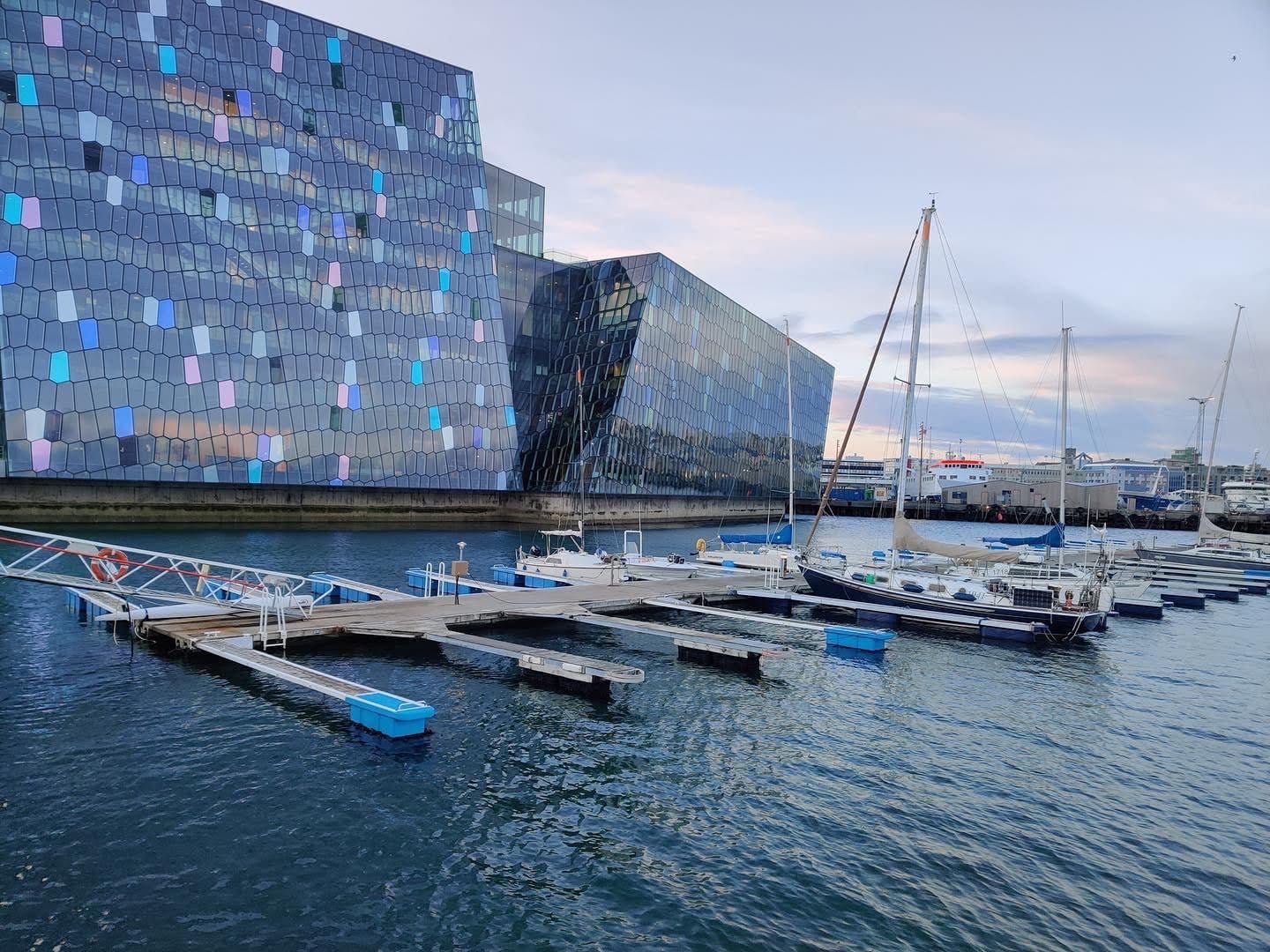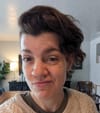Beethoven at the Harpa
Yesterday’s exhausted thought — I want to go home, why did I come here — is replaced by its opposite — I never want to go home, I want to stay here forever.

Friday morning I wake up at 5am. This is a far cry from my target wake-up time of 9:30am, but I’ve slept like the dead for ten hours and going back to sleep is not likely. I make myself lie abed for a while, drowsing and contemplating and enjoying the complete lack of mustness ahead of me. Breakfast is tea and instant oatmeal; today I can add cinnamon, which I was able to decipher in the grocery store yesterday based on the Icelandic Kanill being reasonably close to the Spanish canela (god I love languages).
I depart the hotel around 8am. Dusk and dawn here are as drawn out as an Italian dinner, the light fading in slowly before the sun finally peeks above the horizon, and then withdrawing as slowly after sunset. As I step into the cold this morning, the sky is eighteen shades of blue, the clouds gray and lavender.
I walk along quiet streets in the predawn, down to the path along the water’s edge. A tourist couple has set up tripods at the Sun Voyager, a Viking ship sculpture. They’re taking pictures of the stylized metal ship, then themselves in front of it, then the ship again. Just past the Sun Voyager is a pop-up display of ice sculptures, stylishly lit and being photographed by still more tourists. Gulls scream above me; one comes in for a perfect landing on a light pole. A second gull lands neatly on the back of the first before being shaken off by its irate colleague. As I approach the Harpa, I hear a rhythmic slapping: the ropes on the dozen flag poles, snapping almost in unison. The wind is a sweet whip that pulls tears out of my eyes.
The Harpa is beautiful, even more so at sunrise. I walk along the quay behind it, admire it from several angles; later tonight, I’ll stand inside one of the undulating squares and stare outward while I wait for doors to open for a piano concert. Having admired the building sufficiently, I turn to commune with the water. Boats are chugging towards Engey, the flat-topped island north of the city. For some minutes I lean against the cold stone of the seawall and watch the chopping of the water and try to let it teach me its secrets.
Yesterday’s exhausted thought — I want to go home, why did I come here — is replaced by its opposite — I never want to go home, I want to stay here forever. Always and never are rarely about the future at all; both express the intensity of feeling in the moment, smeared out over imagined time. I’m slowly, slowly learning to look inside these forever thoughts. I never want to leave means there’s something here now that I want to soak in fully. So I stand and let the wind and water wrap me.
Finally it’s time to move on. There’s a hilltop statue of Ingólfur Arnarson to look at, and downtown streets to explore; murals and graffiti, a restaurant called Punk, upscale stores that haven’t opened yet, a swirling rainbow mural on the wall of the queer bar. I wend my way up the central city hill and take in the dramatically stern lines of the Hallgrimskirkja, a modernist cathedral that is quite a bit younger than I. The cathedral isn’t open yet, and I’m not sure that its spaceship vibe is what I want in a church visit today, so I double back to a coffee shop and settle in for some reading. Halldór Laxness’ masterpiece is as spare and beautiful as Iceland; I sink into it for a while, interrupted occasionally by an ecstatic round-faced toddler who pauses at my side a few times during her unsteady survey of the cafe. Her conversation consists of one syllable on repeat, but her intense focus makes this one of the richer exchanges I’ll have this week. Finally, when it feels that I’ve used up the time purchased with my chai and scone, I move along.
Reykjavik has an astonishing number of bookstores for a city of its size. I step into several of them today, finding copies of books by the author I seek but not copies of the book itself. Of course, that failure is itself a pleasure: Gee, guess I’ll have to walk on to the next bookstore, the best kind of scavenger hunt, and it criss-crosses me across town until I end up a short distance from the place I had breakfast the day before. True to form, I retrace my steps and step into Kaffivagninn, where I had my mushroom omelette yesterday. There’s still a sprinkling of old Icelandic dudes, but the composition of the patrons is shifted today, with tourists and Icelandic families predominating. The guy at the register gives a laugh of recognition when I approach and I’m pleased to be remembered; I order fish stew and a bready sweet whose name I’ve already forgotten, but which I proudly manage to pronounce recognizably in the moment. The interior is nearly full, so I try the outside seating. There’s a clear enclosure that provides enough protection from the wind to make the temperature quite pleasant. I shed my coat and settle in with my book to await the stew.
I don’t know if I’ll ever be able to leave an amazing meal half-eaten in a foreign country, but I’m not able to do so now, even though this is easily three times as much as I need. The stew, when it arrives, is more a gratin than soup; a salty, creamy concoction of cream and flaky white fish and onion, garnished with small rectangles of dense rye bread. The dessert is also made with rye, marbled with a sticky fruit but just barely on the sweet side of plain. By the time I start on the dessert I’m seeing stars, so I wrap most of that up to go. It’s a mistake, I know, eating this much this early, but I don’t care. It’s divine.
At least I can walk off some of the density. I wander back through the city center to City Hall, snap a quick photo of the Monument to the Unknown Bureaucrat, skirt the shallow lake and explore some fancy neighborhoods before working my way back to the hotel.
If having a too-rich lunch was my first mistake, I’m about to make my second: I take a nap. I’m breaking Brion Rowley’s #1 Rule of Jet Lag: NO NAPS. However, I want to stay awake for the concert tonight, plus I want to set my body clock so that I’m going to sleep around 1am instead of last night’s 7pm. So I let myself take lie down for ninety minutes.
When I wake up, it’s still light out, which helps me clear the grogginess. I shower and put on my one outfit that makes me look like I’m going to a concert and not on a hike. Between lunch and the nap, I’m not in the least hungry, so I skip dinner and head out.
At night, the Harpa is lit from within and looks amazing. I step inside to a blast of heat and quickly shed as many layers as decency allows. The building is immense and contains a powerful silence; I can hear the happy murmurs of people eating and drinking and talking — from a restaurant or a private event, I’m not sure — but the sound seems puny sitting on top of that underlying silence.
For once I’m not ridiculously early, but I still arrive a few minutes before the doors open. That means I can stand inside the windows I admired this morning, looking out at the sailboats bobbing the harbor. I notice there are coat racks that don’t seem to be guarded by anyone; I’m more worried about mistaking a protocol than that someone will swipe my coat, so after surreptitiously watching a few other guests confidently hang their coats and walk away, I do the same.
The concert is in a tall, narrow room with a dozen rows of seats on a steep riser. On the floor sits a grand piano and bench, nothing else. I’m all the way down front, second row at the right end. The walls are lit with a cool blue luminescence, and I sit quietly while other patrons filter in. This is as good as any church. At length the guests are seated, the lights dim, and the pianist emerges. His name is Luka Okros, originally from Tblisi, Georgia, an Instagram influencer and baby-faced prodigy. He bows, sits, regards the piano for a moment, then turns in his seat to face the audience. He speaks with the diffidence of a very confident person, no need for theatricality, and tells us about the two Beethoven sonatas he’s going to play — Moonlight Sonata, and the Tempest — and his sense of connection to them. Then he turns, gathers himself, and begins to play.
It’s been many, many years since I sat twenty feet away from someone playing a piano with mastery. One of my best friends in sixth and seventh grades is now a renowned conductor; he lived across the street from the American International School I went attended in Kfar Shmaryahu. He played beautifully, even at ten years old, and I loved to stand by the piano while he worked his magic. Now, thirty-odd years later, I close my eyes and sink into the sound.
After the Beethoven and an intermission come four Chopin ballads. Okros explains that the pieces were all written while in exile, and after his introduction I can hear in the music the memory, the nostalgia, the distance, the longing.
It puts me in mind of my own experience on this trip, how for the first time I’m a traveler with a home to return to. A place that I’m from. I grew up in Maryland, but since my earliest memories it felt more like a place of exile, never a place that I belonged. In Israel I felt a sense of connection to place, but always knew it was not really my place. Florida was the waypoint where I got stuck, and not even the profusion of birds and mist in the trees could convince me I belonged there in any way. Now I think of the Pacific Northwest, the land and the people, and begin to understand what it might be like to leave not just a place, but a home.
All this moves through me with the music. The fourth piece ends. Okros bows, leaves, comes back, bows again; he plays two encores, and then we’re released into the night.
